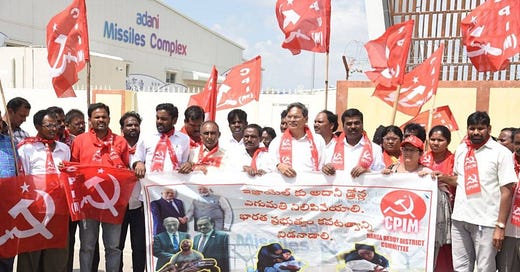Parties in India Protest Arms Exports to Israel
Leftist Parties Accuse Modi’s Government of Complicity in Israel's Genocide in Gaza
On 21 October, left-wing parties in India held a protest and sit-in outside the Adani-Elbit factory in Hyderabad, Telangana, demanding an immediate ban on all weapon supplies to Israel. The protesters, carrying flags and banners depicting Israel’s massacre of Palestinians, chanted slogans condemning Israel’s Zionist regime and its collaboration with India.
S. Veeraiah, a leader of the Communist Party of India (Marxist), Telangana, addressed the protesters, saying that while India has historically supported Palestine, the Narendra Modi government now stands by genocide. He urged opposition parties, including Congress, to unite against imperialist attacks.
Adani Defense and Aerospace (ADA), an Indian company, has allegedly been supplying large quantities of arms to Israel, violating international law and India’s stated position on Palestine. ADA’s joint venture with Israeli defense contractor Elbit Systems, Adani-Elbit Advanced Systems India Limited, is a supplier of Hermes 900 drones, reportedly used in Israel’s wars in Gaza and Lebanon.
Critics claim India’s abstention from voting in favor of the UN Human Rights Commission resolution in April this year, calling for an immediate ceasefire and arms embargo, was due to its arms exports to Israel. Having supported a Gaza ceasefire at the UN General Assembly late last year, India’s position remains inconsistent.
Left parties and civil society groups oppose the Modi government’s policy shift on Israel-Palestine, including alleged arms deliveries which have helped to prolong the Israeli genocide in Palestine. They held a press conference in August, criticizing India’s growing ties with Israel and distancing itself from its historical support for Palestinian resistance. Nationwide protests were also organized by the left on the anniversary of the beginning of Israel’s genocide on 7 October.
Modi government’s alignment with Zionist policies
Modi’s pro-Zionist stance has sparked government crackdowns on anti-Israel protests, with arrests and detentions of protesters and the criminalization of Palestinian resistance symbols.
India was one of the first countries to recognize the Palestinian state, supporting a two-state solution and viewing the Palestinian liberation movement as an anti-colonial struggle. However, since the rise of the Hindu-supremacist Bharatiya Janata Party (BJP) in 2014, India has grown closer to the Zionist regime, developing defense and other partnerships.
The Modi government has taken an ambiguous stance on the Gaza war, refraining from explicitly condemning the genocide of Palestinians. India’s voting pattern on UN resolutions is mixed, with occasional support for resolutions critical of Israel, yet abstentions on others with similar content, such as the recent General Assembly vote calling for Israel to end its “unlawful presence in the Occupied Palestinian Territories without delay and within the next 12 months.” The resolution was based on the recent advisory opinion of the International Court of Justice (ICJ), declaring Israel’s occupation of Palestine illegal.
While the government has not confirmed or denied supplying arms to Israel, numerous national and international reports indicate it is doing precisely that. Last month, India’s top court dismissed a petition to halt weapon exports to Israel—filed by a group of retired diplomats, academicians and activists—arguing that foreign policy is the executive’s domain.
Additionally, India has facilitated the recruitment of thousands of Indian workers for low-paid jobs in Israel, following the ban on Palestinian workers from occupied territories since the war began. Despite opposition from left parties and civil society, the government calls these jobs a “golden opportunity” for Indian youth.




